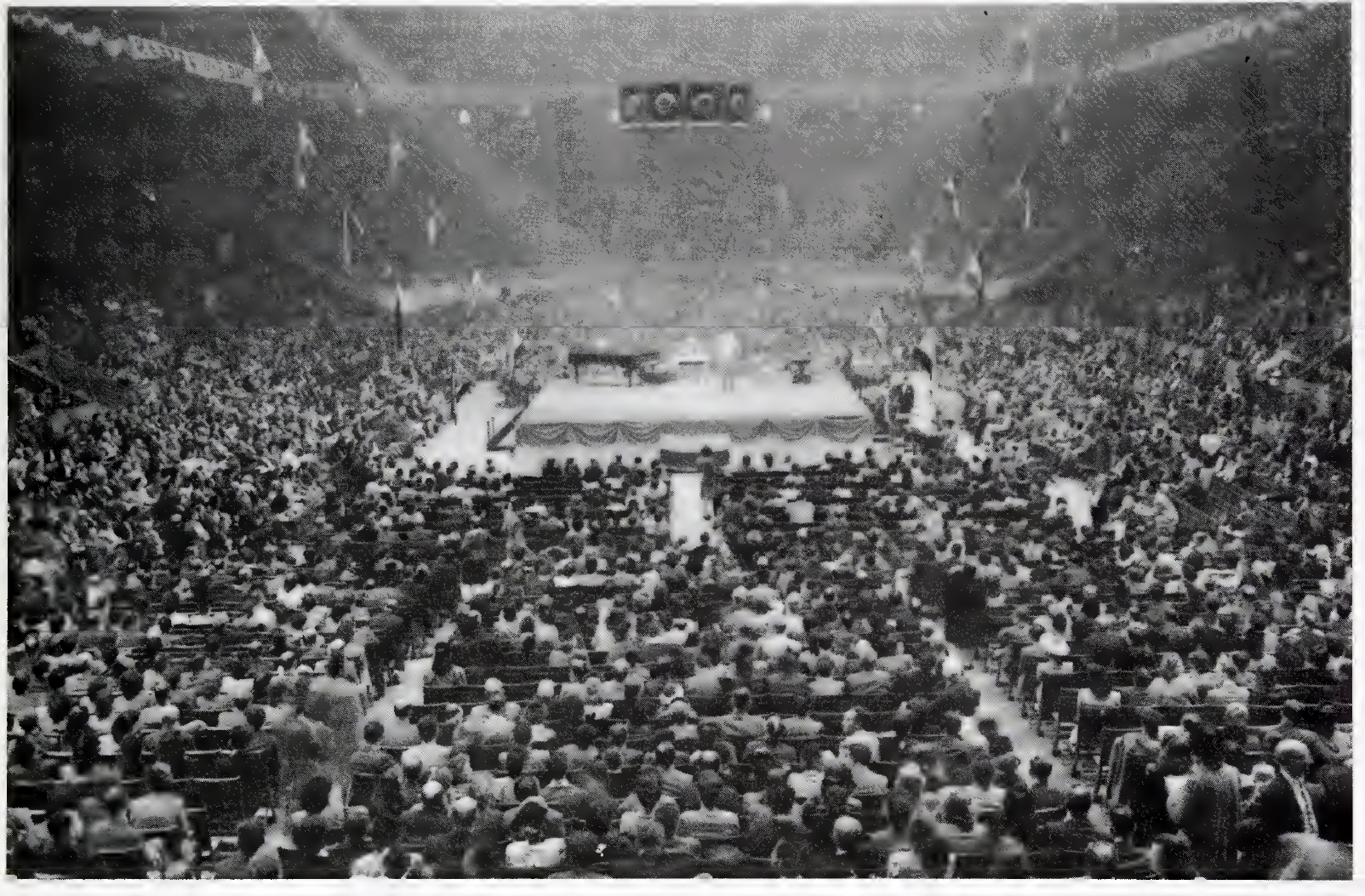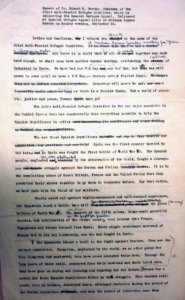Spanish Refugee Appeal: “Franco Must Go!”

Spanish Refugee Appeal Rally, Madison Square Garden, NYC, Sept. 24, 1945. Daily Worker Photo Morgue, Tamiment, NYU.
On September 24, 1945, Dr. Barsky delivered this speech during the Spanish Refugee Appeal rally at Madison Square Garden.
Ladies and Gentlemen, may I welcome you tonight in the name of the Joint Anti-Fascist Refugee Committee. It is about time that we had a Garden meeting for Spain. And there is no doubt that if all of us get together and work hard enough, we shall soon have another Garden meeting, celebrating the victory of Democracy in Spain. We have had our V-E Day and our V-J Day, which this war will never have a V-S Day, —victory over a Fascist Spain. We fought this war to defeat reaction everywhere. Democracy will never be safe, nor can a democratic world exist as long as there is a fascist Spain. For a world of security, justice and peace, Franco Spain must go!
The Joint Anti-Fascist Refugee Committee is the only major committee in the United States that has consistently done everything possible to help the Spanish Republicans in exile; ever increasing its commitments and never failing to fulfill its responsibilities.
Who are these Spanish Republicans in exile and why do they deserve our admiration, our gratitude and our help? Spain was the first country invaded by the Axis, and in Spain was fought the first battle of World War II. The Spanish people, neglected and hindered by the democracies of the world, fought a courageous and heroic struggle against the German and Italian invading forces. It is to the everlasting shame of Great Britain, France and the United States that they permitted their sister republic to go down to temporary defeat. For that action, we have paid with the blood of our soldiers.
Poorly armed and against highly mechanized and well-trained aggressors, the Spaniards waged a battle that will long be remembered even amongst the great battles of World War II. The dangers of the fifth column, large-scale guerrilla tactics, and mobilization of the entire people, were lessons that France, Yugoslavia and Greece learned from Spain. Every single resistance movement of Europe had in its top leadership, men who had fought in Spain.
The Spaniards blazed a trail in the fight against fascism. They are the valiant undefeated. Forgotten, neglected by the world, as no other group has been forgotten and neglected, they have never accepted their fate. Through the long years of their exile, separated from their homeland and their loved ones, they have gone on hoping and planning and fighting for their future. Never for a moment did these Spanish Republicans falter in this struggle. They wrecked railroads, blew up bridges, destroyed mines, sabotaged factories during the period of German occupation of France, and when the moment of liberation came, they fought with the underground. A Spaniard was the first to be killed in the storming of the Paris city hall. French tanks were driven by Spaniards and bands of Spanish Maquis liberated French towns and took thousands of German prisoners.
In the waning strength of their weakened and starving bodies, there burned fiercely the hatred of fascism and the determination to do whatever possible in the fight for democracy.
Today in France there are about 200,000 Spanish Republicans suffering from hunger and illness. Many are still disabled because of wounds received during the war in Spain. Malnutrition, tuberculosis, intestinal diseases and anemias are common, especially among the children. They have no clothes. In many a home, they have to pool their clothing so that one person can go out—in rage—to look for work or hunt for food. Shoes are luxuries: boards tied to their feet are the only protection. In the coming winter, with the severe lack of heating facilities, these people will suffer. There are also the thousands of Spaniards who are now returning from years of servitude in the slave battalions in Germany, weakened by disease, starvation, overwork and inhuman treatment at the hands of their Nazi jailers. Of the 12,000 Spaniards who were in the concentration camp at Mauthausen, only about 1,000 survived. Unless we can help them, many of them will still perish.
Despite all the suffering and the inroads of hunger and illness, the morale of the Spaniards in exile is wonderful. Their only wish is to keep strong enough and to get back to Spain to help rebuild a land of freedom. These people are the guarantee of a democratic Spain. Their children, born within concentration camps, are the future leaders of a great nation that will help cement the forces of world democracy for the insurance of global peace and security.
These, Ladies and Gentlemen, are the Spanish Republicans in exile. We Americans owe them a debt of gratitude. For the sake of our future and as an obligation to our own sense of justice and self-respect, we must make every possible effort to alleviate their sufferings.
The Joint Anti-Fascist Refugee Committee is determined to bring all conceivable aid to these people. For this purpose, we are conducting a campaign known as the Spanish Refugee Appeal. Tonight’s meeting marks the opening of the fall campaign. Our goal for the rest of the year is $300,000. The relief in Frane is administered though the facilities of the United Service Committee, in cooperation with an advisory committee of Spaniards of whom Pablo Picasso is the chairman. In this manner, the money that we send to Frane is most efficiently utilized. In addition to all sorts of welfare and rehabilitation services, we maintain two hospitals in France for the wounded and tubercular. There are also those who are blind and limbless. These require special help. In Mexico, supplementing all types of assistance to the Spanish refugees, we support a school and a hospital. Our funds go to Portugal, Switzerland, Cuba and other parts of the world.
The work that the committee does is a matter of life or death. It takes but a little food to keep a starving man from dying; a little clothes will keep a naked man warm; a little medical care may save a sick man from death.
That is the story, Ladies and Gentlemen, and that is the job the Joint Anti-Fascist Refugee Committee is doing. We have been through a great war, and we have all played our part in this war. We are now confronted with many problems and perplexities—the dangers of inflation, lost jobs, the difficult period of reconversion, the rising threat of reaction within our own country and the confused state of our foreign policy. But despite all these, important as they are, the American people must, and I am sure will, fulfill their obligations to these most heroic Spanish people who at all times preferred to fight and die on their feet than to live on their knees.














